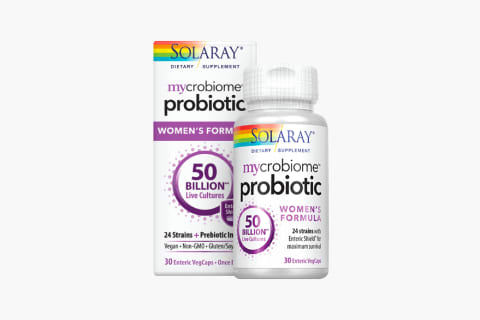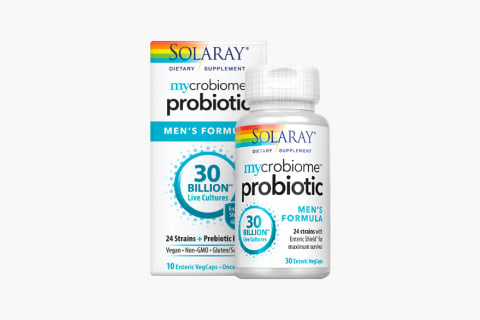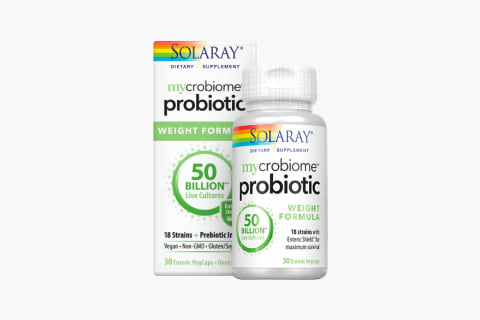Advertisement
If You Only Remember One Rule About Picking An Effective Probiotic, It’s The Last One

You've heard it before, and you'll definitely hear it again: Not all probiotics are created equal. Drinking kombucha or eating fermented foods for a daily dose of gut-healthy bacteria is one thing, but if you're supplementing with a probiotic to up the good guys that help your gut function at its best, you'll want to make sure that what you're taking is actually benefiting you. Below are three things you should check when choosing a probiotic supplement:
1. Strains: More is more.
At any given time, our human microbiome can contain up to 1,000 different species of known gut bacteria1 or more—we're talking tens of trillions of microorganisms altogether. So when you think in this order of magnitude, it's easy to see why the prevailing wisdom says to go for diversity in bacterial strains. In other words, your gut is diverse, so your probiotic should be, too.
Look for a supplement that contains multiple strains (you'll find this on the label), each of which offers a different health benefit and are identified by the genus and species of the bacteria. Four common bacteria genera are Lactobacillus, Bifidobacterium, Lactococcus, and Streptococcus, and they're usually noted with the first initial, followed by the species (like L. plantarum or B. bifidum).

Solaray's line of seven non-GMO Mycrobiome® probiotics includes a Women's Formula containing 24 strains to support needs like bone health, hormone balance, and vaginal and urinary tract health; while the brand's Men's Formula contains 24 strains to support blood sugar balance, energy, and prostate and colon health.
2. CFU: Billions is best.
If all goes well when these bacterial strains reach your gut, they'll start to colonize. Probiotic supplements will denote the number of live microorganisms or colony-forming units (CFUs) it contains on the label, and again, the same rule applies—the more, the better.
Our microbial population is constantly changing depending on our daily diet and hygiene, not to mention other factors like our gender, age, job, and environment. We're talking about living microorganisms, after all. The endgame in taking probiotics to balance our gut is to routinely crowd out the harmful bacteria with beneficial bacteria, but by the time we're an adult, probiotics don't compete very well in our microbiome and may not noticeably affect our health unless there's quite a lot of them. Look for probiotics with at least 15 billion (and up to 100 billion) CFUs. (For general gut health, a common daily serving2 for adults is about 10 to 20 billion CFUs.)
3. Transparency: Just say no to fillers and additives (and yes to enteric capsules).
Your probiotic's packaging should display clear information about the number of strains and CFUs in each serving, the suggested daily serving size, the number of daily servings, the expiration date, any storage instructions, and the brand's contact information in case you have any issues or questions. And don't forget to read the ingredients list carefully to see what you're getting.
The one thing that's important to look for in probiotic supplements is the enteric shield around the capsule—not all brands will have this, but it's crucial to help keep the beneficial bacteria alive and intact inside your digestive tract so that they can colonize in your gut. Solaray shields its Mycrobiome® probiotics with the brand's vegan Enteric Shield®, which protects the live bacteria inside from disintegrating in the stomach's acids on its way to your lower intestine to populate. Bottom line: Pick your probiotic supplement with these three things in mind, and you'll have a better chance of getting the good guys on your side.



